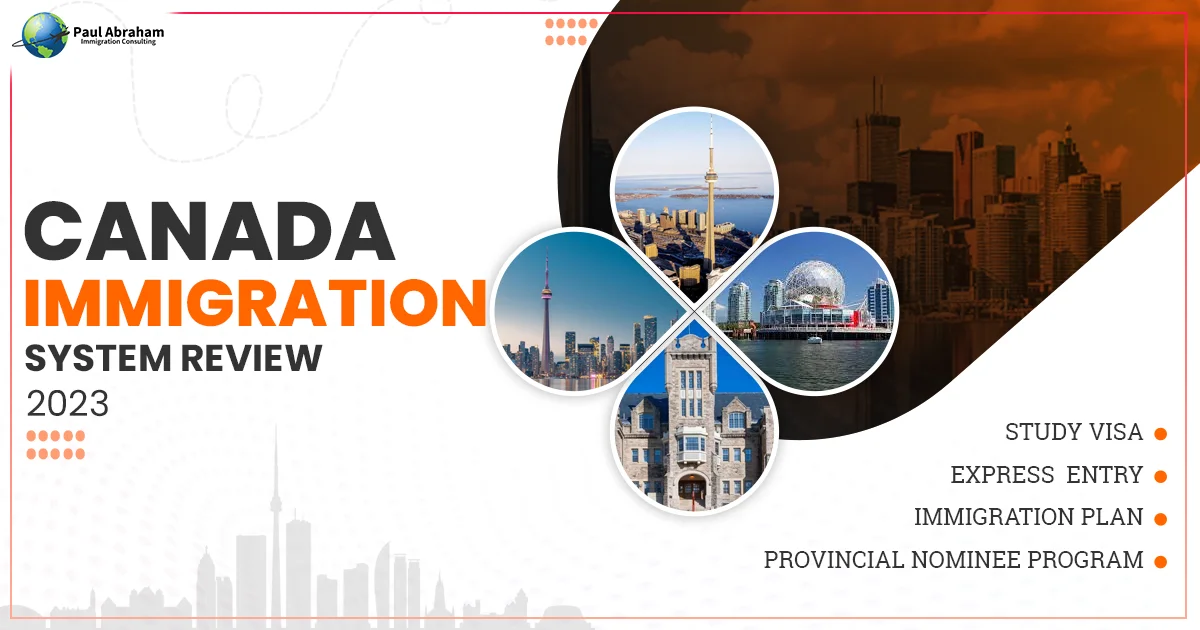A Comprehensive Review of Canada's Immigration System in 2023

Last Updated On : January 15 , 2024
Canada welcomed record numbers in 2023, driven by immigration plans and exciting new pathways. Express Entry category-based draws favouring STEM Occupations and French-speaking candidates, while Provincial Nominee Programs boomed nationwide.
Quebec remained a popular destination for Francophone immigration, and student extensions and language updates made it even more attractive.
Canada's immigration policy opened doors for a bright future by attracting diverse talent, from tech wizards to Federal skilled labourers.
Population in Canada 2023
At the end of 2023, it is estimated to be around 40.5 million. It represents a significant increase from the previous year, with a growth rate of 2.9%.
Canada Immigration Levels Plan 2024 to 2026
The Canadian government has announced its Immigration Levels Plan for 2024-2026, outlining its targets for permanent resident admissions over the next three years. Below are the figures:
- 2024:485,000
- 2025:500,000
- 2026:500,000
New PR pathway for Canada immigration in 2023
Several new PR pathways for Canadian immigration emerged in 2023, each targeting different groups. Here's a breakdown of some key ones:
Category-based Express Entry Selection
In May 2023, Immigration, Refugees and Citizenship Canada (IRCC) launched a major shift in Express Entry with category-based selection. It allows targeted invitations to apply (ITAs) for specific skills, training, or language abilities to address immediate labour market needs.
Provincial Nominee Programs (PNPs)
The nominations across provinces increased significantly due to their focus on addressing Canada's labour shortage.
Quebec Skilled Worker Program (QSWP)
This program targets skilled workers with education, experience, and qualifications in fields the Quebec economy needs.
Employer-Driven Pilot Programs (EDPPs)
These play a crucial role in Canada's immigration system, offering a pathway to permanent residency for skilled workers in specific sectors or regions facing labour shortages.
Start-up Visa
Growing emphasis on innovation, streamlined processes, and focus on international graduates makes it a particularly attractive and relevant PR pathway for eligible entrepreneurs in the current immigration landscape.
Express Entry System 2023 Review
2023 was a dynamic year, offering opportunities for many skilled immigrants and presenting challenges for others. Staying informed about policy changes and proactively improving your CRS score remains crucial to successfully navigating this dynamic system.
Category-based Selection Rounds For Express Entry
In 2023, category-based selection rounds represent a significant shift in Canada's Express Entry system. This approach aims to attract skilled immigrants with specific expertise in crucial sectors for the country's economic growth.
STEM Express Entry Invitations
The introduction of STEM draws in 2023 was a game-changer for skilled professionals in Science, Technology, Engineering, and Mathematics (STEM) fields. These draws offer a targeted pathway to Canadian permanent residency for individuals whose expertise aligns with Canada's growing tech sector.
CRS cut-off for Express Entry throughout the year 2023
Cut-off scores fluctuated significantly throughout the year, ranging from a minimum of 400 (reached twice in December) to a maximum of 511 (recorded in February).
Provincial Immigration Nominee Program 2023 review
The PNP surpassed Express Entry as the main pathway for Canadian permanent residency in 2023, issuing over 100,000 nominations to skilled workers aligned with regional needs, fostering economic growth and filling labour gaps. It conducted more frequent draws, providing faster opportunities for eligible nominees.
Quebec Immigration Review 2023
High hopes with increased immigration targets and focused on French-speaking skilled workers and challenges emerged with stricter eligibility requirements and higher CRS score cut-offs.
French-speaking PR invitations outside Canada
Skilled workers who speak French and want to make a difference in Canada's growing Francophone communities outside Quebec are invited to immigrate. Although not limited to this group, other pathways help them in their efforts to apply for permanent residency.
New rules for International students in Canada
Since January 1, 2024, international students have required proof of CAN$20,635 in readily available funds, reflecting the rising cost of living.
PGWP extension for 2024
As of October 27, 2024, there is no general extension of the Post-Graduation Work Permit (PGWP) program for graduates in 2024. The one-time extension applied to graduates between September 20, 2021, and December 31, 2022, expired at the end of 2023.
Canada Federal Government’s International Students Program Update
The temporary rule letting students work more than 20 hours off-campus while studying ran out in April. The government might make it permanent, but they have yet to decide.
PTE language update for Canada PR
The PTE Core test is officially accepted for all Canadian PR applications. Stay informed with IRCC websites for the latest updates on this exciting change!
Improve your profile for Canada immigration 2024
Boost your CRS score by mastering the essentials:
- Education: Pursue higher degrees or professional licenses, aligning with the Immigrant and Refugee Protection Act (IRPA).
- Work experience: Target Canadian in-demand jobs and gain Canadian employment.
- Language skills: Ace your English or French tests – PTE Core is now accepted!
- Adaptability:Consider Provincial Nominee Programs for targeted opportunities.
F.A.Q.
- Humanitarian pathway: For extended families (children, parents, siblings) of Canadians in Colombia, Haiti, and Venezuela.
- Innovation Stream: To attract high-growth companies and talented individuals (still in development).
